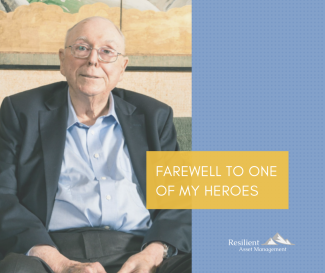
Farewell to one of my Heroes
For most financial professionals, sooner or later, your career winds toward Omaha, Nebraska and Berkshire Hathaway. While a publicly traded company, Berkshire is the life’s work of Warren Buffett and Charlie Munger. True, Buffett gets more of the press, though Munger was every bit his intellectual equal. Some folks admire the Buffett/Munger craft from afar. Others blindly buy the stock and celebrate being a member of the cult. And a smaller set dig deeper hoping to develop a firmer understanding of what’s been done and how.
While I am presently entrenched in the latter group mentioned above, I have at times been amongst the other two. Therefore, learning of Charlie Munger’s passing yesterday was indeed very sad news. In reality of course, Charlie Munger had absolutely no clue who I was, so his passing is not akin to a loved one’s passing. However, given how his life has helped shaped both my personal, and especially, my professional life, I thought it appropriate to say a few words about one of my most admired heroes.
Background
In 2003, I came across the book, Buffett: The Making of an American Capitalist by Roger Lowenstein. Some years before, my dad had purchased Robert Hagstrom’s The Warren Buffett Way for me. It was only after reading both books that I put two and two together about what Berkshire Hathaway was and who the two men were leading it…I’ve blocked out the missed economic opportunity between my reading the two books - it’s painful and probably has a comma or two.
Subsequent to finishing the second book in 2003, I embarked on reading every Berkshire Hathaway Annual Letter from 1977 onwards. Indeed, to this day, the release of the latest version of the Annual Letter, always on a Saturday, remains one of my most anticipated days of the year.
After finishing the Annual Letters, I looked around for more material. That led me to OID, the Outstanding Investor Digest. Essentially, the editor followed Warren Buffett and Charlie Munger around and transcribed their speeches and interviews to the written page…the internet was a bit more primitive then. OID provided a much more of a deep dive into both Buffett and Munger, though especially Munger, who only ever penned one piece in a Berkshire Annual Report.
Along the way, the wisdom was such that I started compiling my own trove of various quotes from both Munger and Buffett. I also added material from other sources over the years. The result is up to 579 pages in Word to which I frequently refer when I need a “refresher” to recenter my financial self.
I thought I would share ten of my favorite (and more impactful) excepts I’ve collected over the year. In the popular literature – think Wall Street Journal articles – you will read more common lines attributed to Munger…perhaps the ones I have chosen you have not yet seen.
Self-Realization
“You have to figure out what your own aptitudes are. If you play games where other people have the aptitudes and you don’t, you are going to lose. And that is as close to certain as any prediction that you are going to make. You have to figure out where you have an edge. And you’ve got to play within your own circle of competence.” Charlie Munger
No other person in my life embodied this principle as much as my own Grandfather, Grampa Romin. He knew the scrap business like no other. Aside from that, besides a little bit of golf, he wasn’t particularly interested.
Investment Concentration
“The way to win is to work, work, work, and hope to have a few insights. If you look at Berkshire Hathaway and all its accumulated billions, the top ten insights account for most of it. And that’s with a very brilliant man—Warren Buffett—devoting his lifetime to it. I don’t mean to say that he has had only ten insights. I’m just saying most of the money came from 10 insights. And when you [only] get a few, you really load up. It’s just that simple.” Charlie Munger
If I have learned anything as a professional investor in equity markets, it’s that outside of an Index-Fund, you really have to concentrate your investments to succeed. So when you realize that something like Alphabet, Costco, or Apple are special companies, you don’t buy a little of it. Rather, you buy a meaningful amount and you ride the wave. Thinking you are going to find 100 great companies year after year is a fool’s errand.
Incentives
“From all businesses, my favorite case on incentives is Federal Express. The heart and soul of their business—which creates the integrity of the product—is having all their planes come to one place in the middle of the night and shift all the packages from plane to plane. If there are delays, the whole operation can’t deliver a product full of integrity to Federal Express customers. And it always screwed up. They could never get it done on time. They tried everything—moral suasion, threats, you name it. And nothing worked. Finally, someone got the idea to pay these people not so much an hour, but so much a shift—and when it’s all done, they can go home. Well, their problems cleared up overnight.” Charlie Munger
I’m including this quote as it refers to my own hometown company, FedEx. Though this line is more easily summarized with “Show me the incentives and I’ll show you the outcomes.” However it’s learned, realizing how powerful incentives are is a critical model to understand in many parts of our lives.
Reading
“I have said that in my whole life, I’ve known no wise person over a broad subject matter area who didn’t read all the time—none, zero. Now I know all kinds of shrewd people who by staying within a narrow area can do very well without reading. But investment is a broad area. So if you think you’re going to be good at it and not read all the time, you have a different idea than I do.” Charlie Munger
This was one of the earlier quotes of Munger’s I ever read. And subsequently, my multi-discipline reading adventure begun. In fact, my very first book on the journey was a biography of Michael Faraday. The book (and Faraday’s life) were so impactful that my son is named after him.
Having struggled with reading as a child, it was tough to kick-start the program. Though over the years the bookshelf – mainly virtual now – has grown quite a bit. While I probably will never read at the Munger-level, I spend a fair amount of time at it.
Deserved Success
“In the end, if they live long enough, I think a fair percentage of people get something roughly near what they deserve. If I’m right on that, the way to get success is to deserve success. It’s just so simple—just so simple.” Charlie Munger
There is nothing in life like deserved success. We see the odd very, very lucky person who wins the lottery. However, that tribe is indeed miniscule. For the rest of us, we are left to the success we earn. In my life, when I have failed, the overwhelming majority of the time it was my own doing. My successes, while I indeed had many to thank along the way, were always earned and it was because I poured myself into it.
Avoid Extreme Ideology
“Well, as I just said, intense ideology, either of the left or the right, is very likely to cabbage up the head of the person who carries the ideology. I think strong ideology works that way. The group-think you get into when you hang around your fellow ideologues aggravates your condition. So generally, I think one should avoid intense ideology. After all, who can really know what’s best for the republic in terms of who the next president is? And yet so many people are totally confident they know the answer. If you have that type of total confidence, in either the Democratic or Republican side, I suggest you get over it. Your brain will work better.” Charlie Munger
I take this quote to heart by trying my best to both be objective and to seek out and read counterarguments to my opinions. Moreover, in my professional life, I have a trusted set of professionals in adjacent fields who I trust will shut down my “good” ideas.
As for politics, a lot of the extremism in the popular media is simple entertainment.
Choosing the Best People in Your Life
“Never wrestle with a pig because if you do you’ll both get dirty, but the pig will enjoy it.” Charlie Munger
No further explanation or example needed.
Basic Advice for all High School Graduates
“Four practices to ensure failure: 1) Be unreliable, 2) Learn everything from your own experience rather than learning from others, 3) Give up trying after your first, second, or third reverse of fortune, and 4) Give in to fuzzy thinking.” Charlie Munger
I have a stock letter I customize for high school graduates with whom I have a personal relationship. The content is highly borrowed from this quote.
Using Financial Leverage, i.e. Debt
“I know a man named John Arriaga. After he graduated from Stanford, he started to develop properties around Stanford. There was no better time to do it then when he did. Rents have gone up and up. Normal developers would borrow and borrow. What John did was gradually pay off his debt, so when the crash came and 3 million of his 15 million square feet of buildings went vacant, he didn't bat an eyebrow. The man deliberately took risk out of his life, and he was glad not to have leverage. There is a lot to be said that when the world is going crazy, to put yourself in a position where you take risk off the table. We might all consider imitating John.” Charles T. Munger on Risk
Though necessary in certain parts of my life, I abhor borrowing…any banker with whom I deal can back me up on this. The above quote changed the way I look at debt in my life.
Learning How to Learn
“If you learn the method of learning, you can go into a strange field and in very short order you can do something that would seem impossible. Particularly if you’re objective, you can go into the other fellow’s profession and do better than the incumbent—at least, on some occasions. This is not something I’d recommend to just anybody. The ordinary result is failure.” Charlie Munger
I’ve tried entering a previously unfamiliar profession twice. Once on a small scale that was an abysmal failure. The other was a resounding success that continues to this day. Both cases were even conceivable as attempts because of my accumulated Munger-inspired knowledge gaining.
Conclusion
The supply of Munger Wisdom could fill many hundreds of more pages. As I reflected on many of his quotes while choosing which ten to include here, I realized what I will miss most of all. I will miss Munger’s ability to distill the very complex down to its simplest terms, without oversimplifying. This is indeed a rare skill, and even more uncommon to witness the same person apply it across multiple disciplines. Fortunately, to the dedicated students, Munger has provided enough counsel over his 99 years and 11 months to enable us to carry on in a similar manner. For me, I owe Charlie a deep debt of gratitude as his professional impact on my life was simply tremendous.



